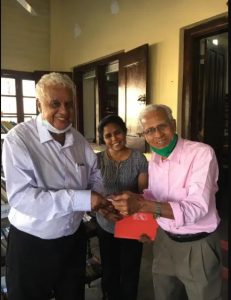Devotion of Black Tigers
by Sachi Sri Kantha, August 13, 2020
Front Note
Twenty five years ago, Prof. Michael Roberts [a Sri Lankan historian cum anthropologist of Sinhalese-Burgher descent, who is currently managing the informative tuppahi blog https://thuppahi.wordpress.com/about/ in his current domicile in Australia] published a short commentary on Black Tigers, in the Lanka Guardian (July 25, 1995). It had the title, ‘LTTE suicides and the Cankam World of devotion’. I provide a scan of this two page commentary, nearby. His thesis was that, Black Tiger culture can be traced to the ancient Purananooru– an anthology of 400 Tamil poems, tentatively dated to the first 500 years of post-Christ era.
LTTE suicides and devotion, Lanka Guardian, 1995, Michael Robert’s essay
In the second paragraph of his thesis, Roberts had written as follows:
“It would seem that the mythologies from the Tamil past, especially from the Cankam (pronounced Sangam) and Chola (Cola) periods, have been utilized by the Tiger leadership over the years to develop the cult of martyred action and military discipline. Indeed I am reliably informed that the Tiger high command is assiduously searching for material from the Cankam literature to sustain their ideological work.” Check the usage of ‘weasel words’ by Prof. Roberts: mythology, cult, reliably informed, assiduously searching.

Prof. Michael Roberts (left)
I submitted a rebuttal to this commentary to Lanka Guardian. This went unpublished. Luckily, I had retained a copy of what I sent to Mervyn de Silva, the editor of that journal. Though 25 years had passed, it still challenges the half-baked view of a Sri Lankan academic, who relishes in posting biased views about LTTE in his blog. My point-blank criticism to the thesis of Michael Roberts was, why one has to travel to first 500 years of Tamil Nadu history in the post-Christ era. How about instead visit 19th and 20th century battlefields?
My rebuttal to Prof. Roberts, rejected by Mervyn de Silva
I wonder whether Abraham Lincoln and Winston Churchill (two military leaders of repute, who led war campaigns in the 19th century America and 20th century Britain) also studied the Cankam literature of Tamils?
Michael Roberts implies that ‘devotion’ is a special ambrosia patented by the LTTE. No Sir! Why not read the Gettysburg Address delivered by Lincoln? The Great Emancipator spoke in the following words:
‘Now we are engaged in a great civil war, testing whether that nation or any nation so convinced and so dedicated can long endure. We are met on the great battle field of that war. We have come to dedicate a portion of that field, as a final resting place for those who here gave their lives that the nation might live. It is altogether fitting and proper that we should do this.
….that from these honored dead we take increased devotion to that cause for which they gave the last full measure of devotion – that we here highly resolve that these dead shall not have died in vain – that this nation, under God, shall have a new birth of freedom…’
After becoming the prime minister of Britain, Churchill, while delivering his first broadcast speech, on 19 May 1940, via the BBC Radio, began with the words:
‘Our task is not only to win the battle – but to win the War … The interests of property, the hours of labour, are nothing compared with the struggle for life and honour, for right and freedom, to which we have vowed ourselves…’
He closed his speech vibrantly with a roaring message: ‘Today is Trinity Sunday. Centuries ago words were written to be a call and a spur to the faithful servants of Truth and Justice: ‘Arm yourselves, and be ye men of valour, and be in readiness for the conflict; for it is better for us to perish in battle than to look upon the outrage of our nation and our altar. As the Will of God is in Heaven, even so let it be.’
What Michael Roberts have failed to see in haste to LTTE’s ‘devotion’ for suicide to Purananooru poems, is that in war times, leaders of Western nations (whether they be Lincoln or Churchill) also have instilled the merit of ‘devotion’ and glamour of death among their charges.
I still look for positive evidence whether Purananooru poems also inspired the leadership of Lincoln and Churchill. As long as this is not forthcoming, one can be certain that the gallant contributions of Black Tigers follows the traditions set by the warriors who died in the American Civil War and Second World War, in service to America and Britain.
*****